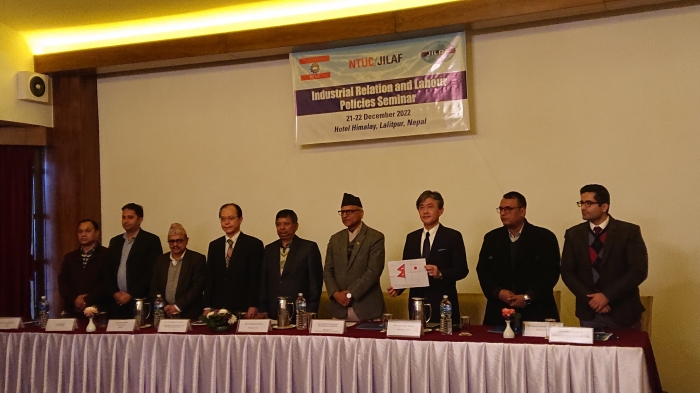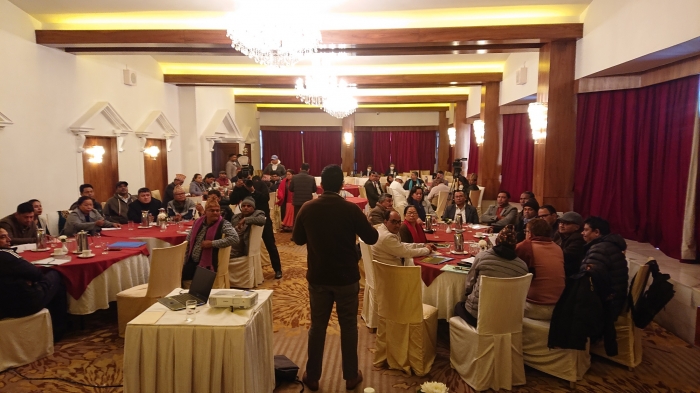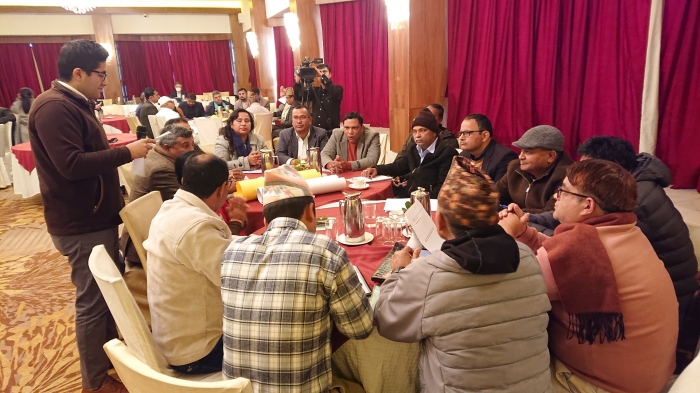ITUC-NAC/JILAF Seminar on Industrial Relations (IR) and Labour Policy in Nepal
From December 21-22, the Japan International Labour Foundation (JILAF), together with the Nepal Affiliate Council of the International Trade Union Confederation (ITUC-NAC), held a seminar on industrial relations and labour policy in Kathmandu, Nepal. The seminar was attended by a total of sixty nine people, including the leaders of each member organisation.
At the beginning of the seminar, opening remarks were made by representatives of the ILO Country Office for Nepal, the General Federation of Nepalese Trade Unions (GEFONT), and the Federation of Nepalese Chambers of Commerce and Industry (FNCCI), alongside Yutaka Kikuta, the Ambassador Extraordinary and Plenipotentiary of Japan in Nepal, and Honorable Minister Dilendra Prasad Badu of the Ministry of Industry, Commerce and Supplies.
Following the opening remarks from the guests, JILAF President Yasunobu Aihara briefly mentioned the significance of the seminar and commended all of those who were involved in the preparations for the seminar. In addition, he also gave his own opening remarks stating, “I hope this seminar will be of some help to your future activities, and will lead you to achieving outcomes such as social and economic development, employment stability, and protection for workers’ rights in Nepal. I would like for us to affirm with one another that now is the time to demonstrate the power of trade unions.” Lastly, President Pushkar Acharya of the Nepal Trade Union Congress (NTUC) expressed his gratitude for the cooperation of JILAF and the Government of Japan, while noting the significance of the seminar.
After the opening of the seminar, JILAF gave a lecture on the topic of “The Characteristics and Background of Industrial Relations in Japan,” in which they touched on matters such as (1) the history and changes in industrial relations in Japan, (2) constructive industrial relations and the circumstances behind them, (3) Japan’s tripartite system, and (4) the government, labour, and management’s responses to the COVID-19 pandemic. Following this, JILAF made a statement stressing, “Although there are issues in Japan’s industrial relations, I think there are some aspects that can be used as reference, given the current state of Nepal’s industrial relations.” I would like for you to use the case of Japan as a cue to check the industrial relations issues in your own workplace and region, and come up with an action plan for improvement.”
Next, FNCCI Senior Expert Hansa Ram Pandey spoke about industrial relations in Nepal stating, “Industrial relations will never be upheld in a situation where employers are fixated on meeting the expectations of investors, while workers solely focus on improving their wages. Industrial relations should be harmonious, not conflicting. Having harmony brings about improvement from both labour and management, which enhances industrial relations, and allows for peace to be achieved within a company. To attain harmonious industrial relations, both labour and management need to listen carefully to what the each other has to say, and sometimes need to have patience. Even if negotiations fail, it is important to set up a space to have repeated discussions. Also, if industrial relations can be built not only within a company but also at the industrial union level, I believe that various problems can be resolved more quickly. I would like to improve communication between labour and management, and tackle management issues and initiatives towards digitalisation.”
In addition, Krishna Adhikari, the Director of the Social Security Fund (SSF), gave a lecture on the social security system in Nepal, while focusing on the expansion of the system to the informal sector. In response, several demands to the government and questions were raised on a wide range of matters, such as eligibility for the system, administrative procedures for joining, and advantages of the system.
On the second day, the participants gave a report reflecting on the first day, then NTUC General Secretary Yogendra Kumar Kunwar spoke about the current state of industrial relations in Nepal, while touching on the past activities of JILAF stating, “In Nepal, when labour and management have discussions and express opinions about a topic, they don’t really consider how the other party would feel towards the expressions they use. However, when I participate in JILAF’s projects, I learnt that it is possible to build relationships of trust through small efforts such as rephrasing the same opinion or assertion in a positive rather than negative manner, and making efforts to find good points instead of only arguing about you’re dissatisfaction with one another. Don’t we need to make these small efforts now?”
At the end, Saurabh Shah, the National Project Coordinator of the ILO, reflected on the two-day seminar and concluded, “Constructive industrial relations are needed for the development of companies. Also, improved social dialogue is needed to allow Nepal to breakaway from its status of being a developing country in 2026. To fulfil these needs, trade unions are essential. We hope that this seminar will serve as an opportunity to reaffirm the role of trade unions and the importance of dialogue.”



